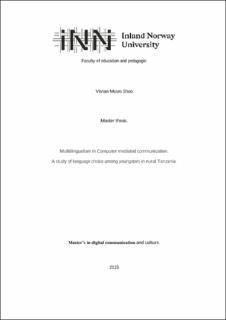Multilingualism in Computer mediated communication. A study of language choice among youngsters in rural Tanzania.
Master thesis

Åpne
Permanent lenke
https://hdl.handle.net/11250/2764701Utgivelsesdato
2019Metadata
Vis full innførselSammendrag
African youth linguistic practices have merely been regarded as an urban phenomenon that has nothing to do with rural areas. They have sometimes been labelled as urban vernaculars, a label that excludes creative linguistic practices of rural youths. This thesis aims to study how linguistic practices of Tanzania’s multilingual rural based youngsters are reflected in Computer mediated communication by examining to what extent are their linguistic practices fixed in the sense that they orient to the monolingual system and standard varieties or fluid in the sense that their whole linguistic repertoire is involved in the meaning-making process. I also examine which languages these youngsters use.
I introduce multilingualism by considering its historical background regarding its evolution during the last six decades as well as a brief explanation of Computer mediated communication in general and in Africa. I have chosen to briefly introduce and explain language situation in Tanzania because its awareness will ensure understanding of the aim of research topic and the analysis of the youngsters’ linguistic practices in Computer mediated communication. Throughout the theory chapter, there will be a discussion of multilingualism’s central concepts such are language choice and code-switching. However, data in this thesis will be analyzed in the light of fixity and fluidity, and theories that suppose fluid linguistic practices, such as metrolingualism and translanguaging are also introduced in the theory.
This study is done through a qualitative research design. Data used in this thesis is based on individual interviews and observation collected from six rural based Tanzania’s youths. There is a total of 22 examples of both interviews and observation selected to represent the main tendencies in the data. Findings of this study shows how youths’ linguistic practices in computer mediated communication challenge the monolingual approach to language emphasized by once but no longer hegemony state that is Tanzania. Online youth linguistic practices appear in many different shapes characterized by both local and global practices witnessed in many various social networking sites. Such linguistic diversity in computer mediated communication is contributed by various motives.
Beskrivelse
Mastergradsoppgave i digital kommunikasjon og kultur, Høgskolen i Innlandet, 2019.